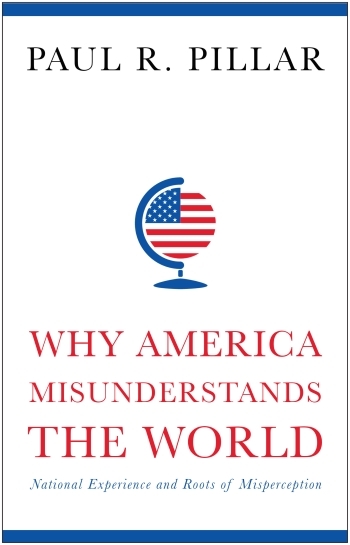The Role of Shared National Experience in Foreign Policy
“Americans’ shared national experience heavily influences the way Americans perceive the outside world, which in turn has a major influence on U.S. foreign policy.” — Paul Pillar
This week, our featured book is Why America Misunderstand the World: National Experience and Roots of Misperception, by Paul R. Pillar. To kick off the week’s feature, we have an excerpt from Pillar’s preface, in which he discusses the genesis of and his goals for his book.
Don’t forget to enter our book giveaway for a chance to win a free copy of Why America Misunderstands the World!
I have spent most of a lifetime interpreting the actions and perspectives of foreign nations or managing others whose job it is to perform such interpretation. This experience has included a career with the U.S. Central Intelligence Agency and later work as an academic and independent scholar writing about foreign policy and international relations. The interpretations have not always been correct, but the effort to make them teaches some lessons that involve knowing oneself better by getting to know others. In this context, “self ” and “others” can apply to nations as well as to individuals. Two lessons in particular are relevant.
One is that to understand a nation’s decisions and behavior requires understanding the perspectives that the people in that nation, including its decision makers, have acquired through their shared national experience. The nation’s triumphs and tragedies and the rest of its history color the images that its people and its leaders have of the rest of the world, and those images in turn guide how that nation behaves toward the rest of the world.
The other lesson is that the portion of the U.S. bureaucracy in which I formerly worked is not the principal guide for major decisions in U.S. foreign policy. The images of the world abroad that have influenced U.S. policy the most have come from other sources.
Putting those two lessons together leads to a third: that Americans’ shared national experience heavily influences the way Americans perceive the outside world, which in turn has a major influence on U.S. foreign policy. In an earlier book, I described how and why the intelligence bureaucracy is not the main place to look for images that have guided major U.S. foreign-policy decisions. The present book addresses one of the places we do need to look for those images. The premise is that the distinctive circumstances and history of the United States yield distinctive, important, and policy-relevant ways that Americans perceive the rest of the world.
This book unavoidably has a downbeat message in that any discussion of how perceptions are shaped by the perceiver’s attributes is in large part a discussion of misperception and error. This fact does not imply, however, an overall negative outlook about the American experience or about many of the traits and attitudes that flow from it. In the course of many years of studying the troubles and flaws of other nations, I have repeatedly been reminded of why I am glad and proud to be an American.
Knowing oneself is a virtue, for nations as well as for individuals. This book has been written to add modestly to collective American virtue by helping Americans become more aware of the twists that they habitually impart to their view of what lies beyond their borders and of why they impart those twists. It also is written in the hope that such awareness will help lead in some small way to a less twisted and more accurate understanding of the world and thus to better-informed U.S. foreign policy.




